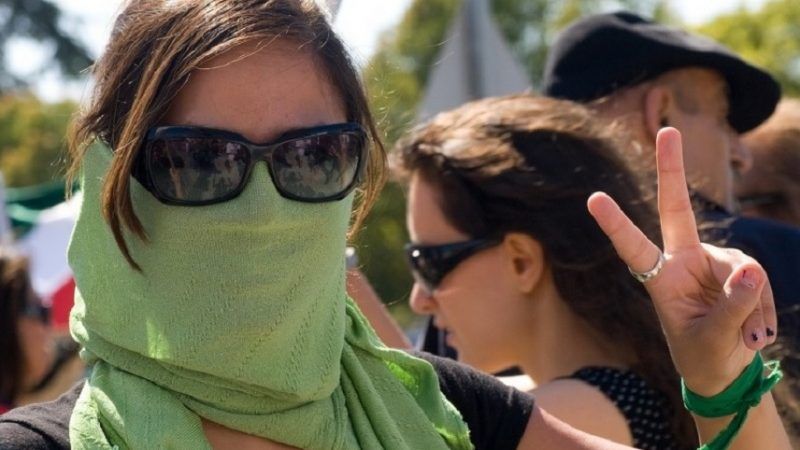Wearing a Mask in Public Shouldn't Be a Crime
In a free society, the default position should be the one that upholds individual liberty

Last weekend's demonstrations on Monument Avenue in Richmond, Va. didn't descend into rioting and mayhem, for which we can all be thankful. Only seven people were arrested—and four of them shouldn't have been.
Three of them are students at Virginia Commonwealth University, and the fourth is a former student. They were on hand to protest the neo-Confederates who had come to town, and were arrested for wearing masks in public. One wore a bandanna over her face; the others wore Halloween masks. In Virginia, wearing a mask or hood to conceal your identity is a felony.
In one of those amusing coincidences of which the universe seems so fond, their trials have been set for Oct. 31—Halloween. In another amusing coincidence, the law they are accused of breaking was passed in 1952, in an effort to stymie the KKK's effort to start a chapter in Richmond.
Actually, that is neither amusing nor a coincidence. Laws passed for the sake of protecting racial minorities or limiting the power of the majority often wind up being used for precisely the opposite purpose.
In April, for instance, two women were charged with a hate crime after they burned a sign supporting Donald Trump. Louisiana's "blue lives matter" law forbidding hate crimes against police officers has been interpreted to mean resisting arrest is a hate crime. Hate-speech laws have been used to shut down government critics in Kenya and punish anti-Israel activists in France, among many other examples.
As Glenn Greenwald wrote recently in The Intercept, "This is how hate speech laws are used in virtually every country in which they exist: not only to punish the types of right-wing bigotry that many advocates believe will be suppressed, but also a wide range of views that many on the left believe should be permissible, if not outright accepted… Ultimately, what constitutes 'hate speech' will be decided by majorities, which means that it is minority views that are vulnerable to suppression."
But the law against wearing masks in public is not a bad law because (or only because) it might affect college students protesting racism in addition to white supremacists trying to sustain it. It is a bad law because it infringes on individual freedom without justification.
To begin with, some people have legitimate grounds for wanting to conceal their identity in public. Just ask the many officers of the Virginia State Police who covered up their name tags while working last Saturday's protests. Like Carolyn Hill, the student who was arrested for wearing a bandanna, they did not want internet trolls tracking them down online and harassing them.
Second, people have other reasons for covering their faces in public. A political activist might wear a mask of Guy Fawkes or Nancy Pelosi to make a political point. That's free speech, protected by the First Amendment.
Muslim women often wear a niqab out of modesty. That's religious freedom, protected by the First Amendment.
People with weakened immune systems sometimes wear masks to protect them from infection.
And of course, there's Halloween.
We could carve out exceptions for people in those circumstances—and the current statute does make medical and holiday exceptions—but why should we?
Why should prohibition be the default position? In a free society, the default position should be the one that upholds individual liberty—and government should need a good reason to carve out an exception.
After all, in 99 cases out of 100 a mask doesn't hurt anybody. The law should not prohibit things that do nobody any harm.
But what about the hundredth case? Easy. There's no blanket prohibition against using a firearm, but the law imposes additional penalties for using a firearm in the commission of a felony. We could treat masks the same way.
True, sometimes cases might arise in which mask-wearing makes work harder for the police. If the police have surveillance video of a riot, for instance, identifying the culprits is easier if none of them is wearing a mask. But this is an unusual circumstance, and the law ought to be written for the norms, not the exceptions.
Besides: It's wrong to abrogate someone's rights simply to make life easier for the police. After all, the task of law enforcement would be much easier if the police didn't need warrants, or probable cause, and you had no right to remain silent or to have an attorney present, and so on.
As long as they're not hurting anybody else, people should have the legal right to cover their faces in public. Then, if they do hurt someone, arrest them. Then they can trade in the mask for an orange jumpsuit. Problem solved.
This column originally appeared at the Richmond Times-Dispatch.


Show Comments (157)